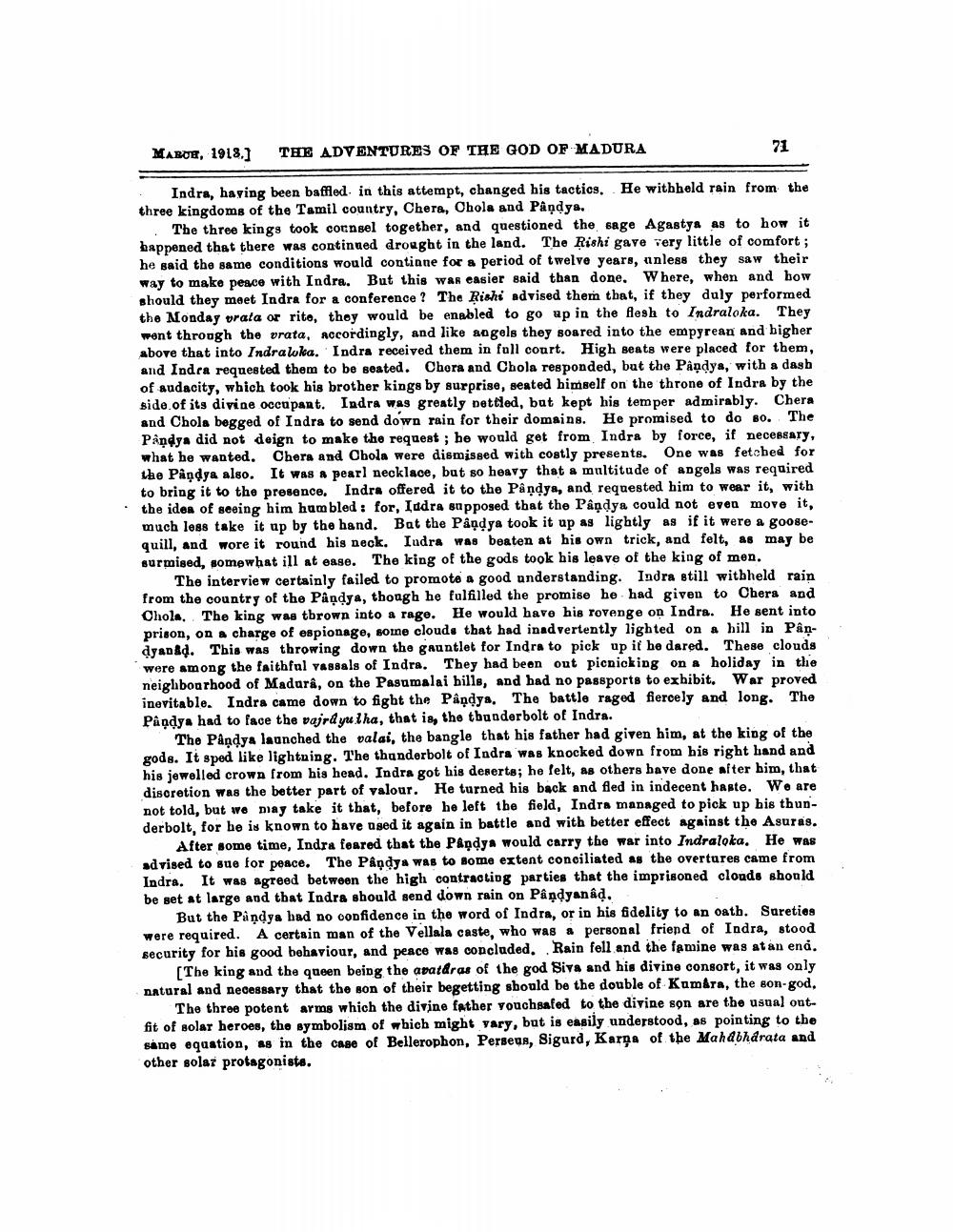________________
MABUE, 1918.]
THE ADVENTURES OF THE GOD OF MADURA
71
Indra, having been baffled in this attempt, changed his tactics. He withheld rain from the three kingdoms of the Tamil country, Chera, Chola and Pandya.
The three kings took counsel together, and questioned the bage Agastya as to how it happened that there was continued drought in the land. The ishi gave very little of comfort; he said the same conditions would continne for a period of twelve years, unless they saw their way to make peace with Indra. But this was easier said than done. Where, when and how should they meet Indra for a conference? The Rishi advised them that, if they duly performed the Monday urata or rito, they would be enabled to go ap in the flesh to Indraloka. They went through the vrata. Accordingly, and like aogels they soared into the empyrean and higher above that into Indraloka. Indra received them in full court. High seats were placed for them, and Indra requested them to be seated. Chera and Chola responded, but the Pandya, with a dash of audacity, which took his brother kings by surprise, seated himself on the throne of Indra by the side of its divine occupant. Indra was greatly pettled, but kept his temper admirably. Chera and Chola begged of Indra to send down rain for their domains. He promised to do so. The Påndya did not doign to make the request; he would get from Indra by force, if necessary, what he wanted. Chera and Chola were dismissed with costly presents. One was fetobed for the Pandya also. It was a pearl necklace, but so heavy that a multitude of angels was required to bring it to the presence, Indra offered it to the Pandya, and requested him to wear it, with the idea of seeing him humbled : for, Iddra supposed that the Pandya could not even move it, much less take it up by the hand. Bat the Pandya took it up as lightly as if it were a goosequill, and wore it round his neck. Indra was beaten at his own trick, and felt, as may be Burmised, somewhat ill at ease. The king of the gods took his leave of the king of men.
The interview certainly failed to promote a good understanding. Indra still withheld rain from the country of the Pandya, though he fulfilled the promise he had given to Chera and Oholm. The king was tbrown into a rage. He would have his rovenge on Indra. He sent into prison, on a charge of espionage, some clouds that had inadvertently lighted on a hill in Pândyanad. This was throwing down the gauntlet for Indra to pick up it be dared. These clouds were among the faithful vassals of Indra. They had been ont picnicking on a holiday in the neighbourhood of Madura, on the Pasumalai hills, and had no passports to exhibit. War proved inevitable. Indra came down to fight the Pandya. The battle raged fiercely and long. The Pandya had to face the vajrd yu lha, that is, the thunderbolt of Indra.
The Påndya launched the valai, the bangle that his father had given him, at the king of the gods. It sped like lightning. The thunderbolt of Indra was knocked down from his right hand and his jewelled crown from his head. Indra got his deserts; he felt, as others have done after him, that discretion was the better part of valour. He turned his back and fled in indecent haste. We are not told, but we may take it that, before he left the field, Indra managed to pick up his thunderbolt, for he is known to have used it again in battle and with better effect against the Asuras.
After some time, Indra feared that the Pandys would carry the war into Indraloka. He was advised to sue for peace. The Påņdya was to some extent conciliated as the overtures came from Indra. It was agreed between the high contracting parties that the imprisoned clouds should be set at large and that Indra should send down rain on Pandyanad.
But the Pandys had no oonfidence in the word of Indra, or in his fidelity to an oath. Suretios were required. A certain man of the Vellala caste, who was a personal friend of Indra, stood security for his good behaviour, and peace was concluded. Rain fell and the famine was at an ena.
[The king and the queen being the avatdras of the god Siva and his divine consort, it was only natural and necessary that the son of their begetting sbould be the double of Kumara, the son-god,
The three potent arms which the divine father youchsafed to the divine son are the usual ontfit of solar heroes, the symbolism of which might vary, but is easily understood, as pointing to the sáme equation, as in the case of Bellerophon, Perseus, Sigurd, Karna of the Mahabharata and other solaz protagoniste.




